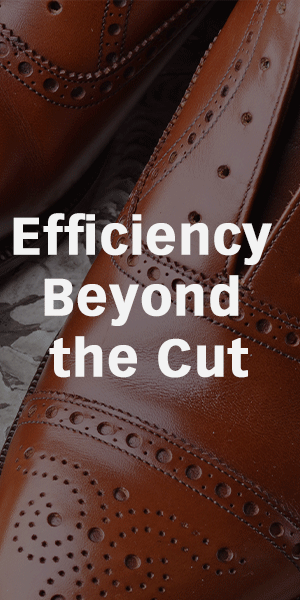Materials search bears fruit for Camper

A desire for sustainable, high-performance materials for its footwear moved Camper to enter into discussions with the Lenzing Group and to add TENCEL to the list of natural fibres in its products.
Footwear brand Camper has redesigned two of the women’s styles in its autumn-winter 2020 collection to incorporate TENCEL-branded lyocell in the upper. The Mallorca-based brand said TENCEL’s sustainability credentials, based on its biodegradability and having wood pulp as its raw material, and its performance characteristics were the main reasons for working with the fibre’s producer, the Lenzing Group.
Dialogue between the two companies began in 2017 at a time when Camper stepped up its efforts to replace synthetics in its shoes and boots. Leather is still pivotal in the Balearic brand’s wider offering, but expanding its range of styles in recent years has also led to greater diversity in the materials it has used in its uppers. However, it has put in place a commitment to remove all virgin plastic from its uppers by 2022, leading it to look closely at alternatives. It is in this context that its Right and Upright models of women’s boots now include versions with a mix of TENCEL and synthetic fibres in the uppers, along with a rubber outsole and removable EVA insole.
Homework complete
It’s five years since the Lenzing Group began to explore the use of TENCEL-branded fibres in footwear. “We’ve been taking some time do our homework and explore the usage of our fibres in footwear,” Lenzing’s head of global business development for functional wear, Birgit Schnetzlinger, says. The fibres are now in use in uppers, linings, laces and soling materials for Strobel constructions. There is more to come; there are commercial partners preparing to use Lenzing materials in powder form in outsoles. In her opinion, many shoe brands were less quick than apparel companies to make conscious efforts to move to more sustainable materials. However, the fibre manufacturer’s efforts to make an impression on the footwear world are beginning to pay off.“Sustainability is a door-opener with all brands now,” she says. “Consumers ask detailed questions about products, about their origin and about the materials they use before buying now. So, the interest of brands is at a very high level.”
In contrast to a shift from, say, virgin polyester to recycled polyester she acknowledges that using a different material such as TENCEL for the first time may present challenges and changes for design and production teams. But she insists that it is worth the effort. As well as its sustainability claims, she points to performance advantages that TENCEL fibres can offer. These include a high level of moisture management functionality and levels of breathability that can deliver important benefits by making the microclimate inside the shoe more comfortable. Ms Schnetzlinger points out that sneaker brands were among the early adopters of the material in footwear. To have convinced “an iconic brand” such as Camper to use TENCEL fibres in fashion boots is important progress, she suggests, saying: “We’re very glad that these products have come out."
The power of partnership
The Austrian fibre manufacturer is also glad this new partnership seems to have worked well. One of its strategic principles is to work with partners to deliver system change. Birgit Schnetzlinger explains: “If you want to make an impact, you have to join forces.” Another good example of this is that, at the start of this year, the Lenzing Group was one of a number of fibre and clothing companies to sign up to a new initiative called Accelerating Circularity. The aim is to transform the linear value chain of today into a more circular one. Her contention is that the Lenzing Group is in a good position to support this transformation.
It has already chalked up success with REFIBRA, the technology that launched in 2017 using TENCEL lyocell with added fibres from waste cotton and wood. More recently, it introduced carbon-zero TENCEL fibres; it has calculated emissions associated with the fibre’s production and offset them. “Our water footprint is good too because the trees from which the wood pulp comes to make the TENCEL fibres are from responsibly managed forests and require no irrigation. These ideas give us and our customers more options.”
Expect the unexpected
Camper’s product design director, Cecilia Llorens, says TENCEL has been a good option for the footwear brand, describing it as “perfect for us”. On top of the fibre’s environmental credentials and moisture-wicking functionality, she has also found its softness, adaptability, strength, elasticity and resistance to be important qualities. “We have high requirements,” she says, “and TENCEL stands up very well. That’s why we have incorporated it into these new versions of two of our most iconic products.”
The elasticity and resistance that TENCEL fibres offer provided the shape-memory qualities that Camper needed to develop the 3D sock that forms the upper of these new versions of Right and Upright. The uppers are 59% TENCEL lyocell fibres, 40% polyester and 1% spandex. “It works in this construction,” Ms Llorens says. “It gives a pleasing aesthetic, the boots are comfortable and keep their shape.” Right has been an important part of Camper’s range for women for 15 years, with a heeled version, Upright, joining it two years ago. The original leather versions are still popular, but the new TENCEL fibre alternatives offer something that the product design director describes as “progressive, fashion-forward and easy-to-wear”.
She explains that sustainability has been “embedded in Camper’s philosophy” for the whole of its 45-year history and that it continues to strive to develop maximum comfort in the most sustainable way. All of this has the brand’s Mallorcan roots as a backdrop. Its headquarters have always been in Inca, in the rural interior of the island, and Mallorca’s artisan footwear-making heritage is at the heart of what Camper strives to achieve. “Authenticity is everything for us,” Cecilia Llorens says. “It’s in our genes. But, in our designs, we are also always challenging ourselves to experiment with new aesthetics and to surprise the consumer. Offering the unexpected is also part of our DNA.”
Camper believes the new Tencel versions of Right and Upright offer women a “more progressive, more fashion-forward and easy-to-wear” iteration of the popular boots.
Credit: Camper












